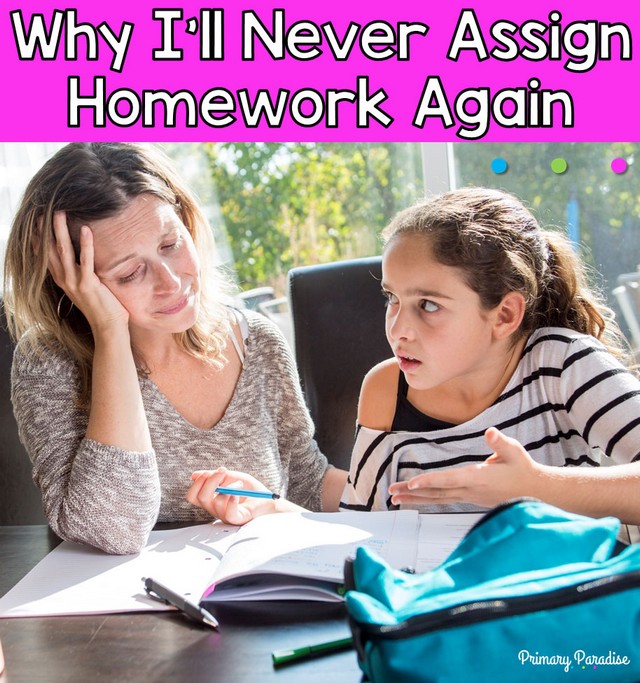Homework in elementary school: Many teachers, parents, and students feel very strongly about homework. Should you assign homework in elementary school? And, if so, how much? Here’s why I’ve decided I’ll never assign homework again. Period.
Homework in Elementary School: Everyone is Doing It
Although I’m currently teaching as a reading interventionist, when I was a classroom teacher, I did assign homework. When I first started teaching, I didn’t even think about it. I had to do homework as a student. The other teachers on my team assigned homework. So, I did too. As a new teacher, it was easier to just do what everyone did. For my first graders, I sent home one math practice sheet, a book to read, and had my students fill out a reading log Monday-Thursday. (I didn’t give homework on weekends.) Once a quarter, we were required to send home a family project, so I did that as well. And, yes. That project was graded.
When I moved to a new school and began teaching second grade, I began to question homework. I still assigned it because everyone else did. (FYI: that’s really a terrible reason to do anything.) However, I started telling parents that if it was too much or interfering with afternoon or evening activities, they could skip it. I shortened what I sent home for reading. I also stopped grading or tracking homework at all. Sure, I’d check it when it came in, but it was not going to effect my students’ grade.
Now? If and when I move from my intervention position and I’m a classroom teacher again, I would not assign homework at all.
8 Reasons I’ll Never Assign Homework Again
Research shows that homework in Elementary grades, at best, has no bearing on achievement. It really doesn’t offer any benefit until high school. At worst, homework can cause all kinds of issues for our students. So, here are the reasons (in addition to the research) that I will never give my students homework again.
- First, in my classroom, we don’t waste time. I have high standards for my students. We work and learn hard from the second they walk in to the second they leave. After working hard for six hours, I don’t feel that it’s fair to send them home to do more work.
- Second, and a related point, studies show that adults in America are workaholics and that many of us come home from work and continue to do more work. This isn’t healthy for adults, and it’s certainly not healthy for kids. Just as work life balance is important for our health and sanity, school life balance is important for our students. Recently, there’s been a huge focus on self care, and I believe that pertains to students as well. After all, they’re people too.
- Third, I’d much rather my students spend time with family. I don’t mean spending time with family while arguing over homework. If parents are able to be around after school, I want my students to spend quality time with them. They should not spend time getting frustrated together over 6+12. Additionally, homework in elementary school typically requires parental support. Students may not always have a parent who can help them for a variety of reasons. That means that student is then on their own, an older sibling has to help them, or the homework just won’t be done.
- Fourth, many elementary students are involved in after school sports and activities which are shown to have a ton of positive benefits such as boosting academic performance and developing social and team work skills. If they are, getting kids to their activities, feeding them dinner, and getting them to bed at a decent hour is hard enough without the added stress of a math packet to worry about.
- Fifth, as a parent myself, I can say that evenings are hard. Between trying to spend some time with my children, making dinner and prepping lunches and things for the next day, the evenings go by in a blink. I don’t want to make the evenings when parents and students should hopefully be recharging and relaxing more stressful. And I certainly don’t want to add another burden to parents’ workload.
- Sixth, typically the students who do well on homework don’t need the homework in the first place. They already understand the concept. The students who struggle with homework probably need more assistance from you as a teacher because they haven’t grasped that skill yet. That means it’s too easy (and in that case a waste of time) for some students, and a huge stressor for the ones who do need extra practice. Parents also may not know how to support their struggling students with the homework.
- Seventh, even if you send homework that should only take 10-20 minutes, that doesn’t mean it does. I’ve seen firsthand through my nephews and nieces that sometimes “quick” homework can turn into hours and hours of agony for both children and parents. This can not only lead to frustration and resentment towards school, but it can seriously cut into sleeping time, which is incredibly important for children’s success.
- Eighth, homework can be a huge cause of anxiety for children. This is especially true for those students who are prone to anxiety in the first place or those who are struggling in school but are also people pleasers who want to do the right thing. I’ve heard countless stories from friends who are stuck at the dining room table with their elementary student for hours some nights. They don’t understand how to do their homework, but insist on finishing it so they don’t “get in trouble”. In a world where our children are feeling more and more anxious, I do not want to add to the anxiety.
Homework Alternatives
If and when I’m a classroom teacher again, I would never assign homework. No math practice sheets, no reading log, and definitely no take home projects. If we can’t finish something in school, we will do it the next day. If a student is struggling with a particular skill, I will use small group time to work with them. I would (and do) encourage my students and their parents to read together at home. However, there would be no reading log, no summary, no tracking system. I’ve always loaned books to families who don’t have access or simply those who request them, and I would continue to do that. I might ask my students to share any good books they’ve read at home that they think their friends would like during morning meeting.
I would encourage my students and their parents to get outside and play as much as possible and to use their evenings to rest, relax, and laugh together. Childhood is fleeting, and I don’t want them to spend it doing homework. If my students are in after school activities, I’d encourage them to work hard and have them share about what they’re working on or any new skills they’ve learned during morning meeting as well.
What If Parents Want Homework?
There are always a few parents who WANT homework to do with their children, so how would I handle that? I would encourage them to read to and with their child. Research shows that reading with children is one of the best ways to help them be successful in school and life. I’d also encourage them to talk with their child. I don’t mean “How was your day” (although there’s nothing wrong with that). I’d encourage them to ask how they’re feeling, what the best and worst part of their day was, what is exciting them right now, what are they looking forward to right now, what are their hopes and dreams and so on. I’d tell parents to play board games, get outside, and again, read and talk with their child. School is too long and childhood evenings are too short to spend them fighting over reading logs, 6×3, and making yet another last minute poster board project.
You can join my FREE Facebook Club for k-2 teachers here!
Find me on Instagram, Facebook, Twitter, and Pinterest!




